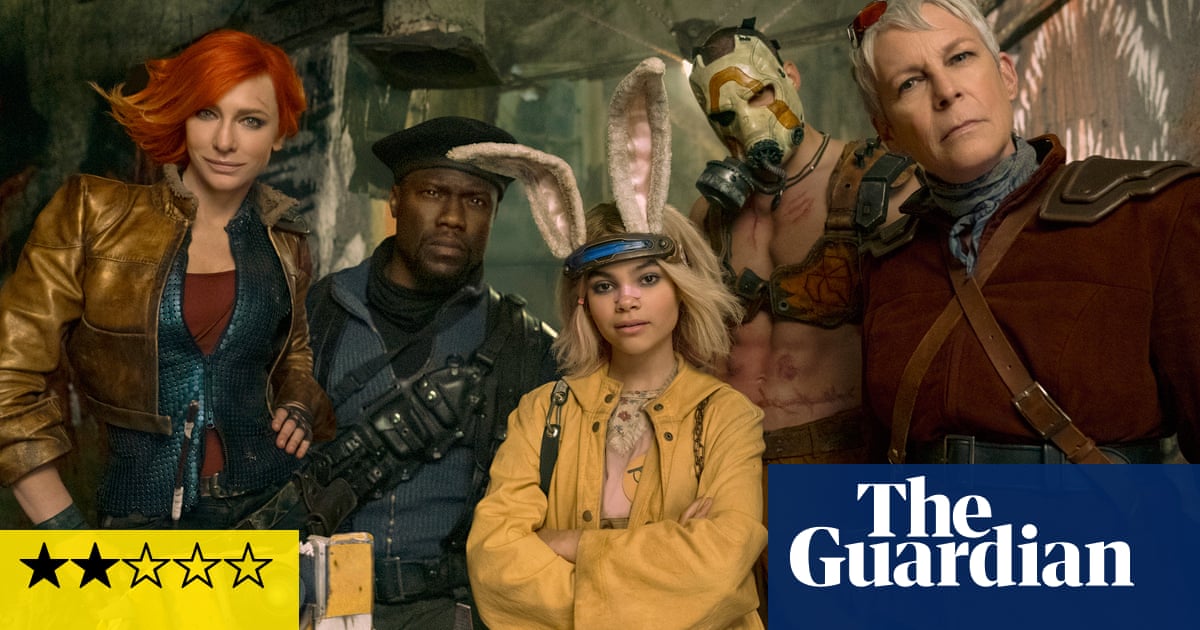Videogame fans will probably have a strong opinion on how the new sci-fi movie Borderlands fares as an adaptation of the game franchise. (A negative one seems most likely, based on any number of factors.) But for a different genre of nerd, Eli Roth’s long-delayed, faux-irreverent space adventure will feel like something out of 90s comic books, crossbred with contemporary superhero movies. Specifically, this incarnation of Borderlands is reminiscent of a third-tier title from a company nipping at the heels of DC or Marvel. It’s as if early-period Dark Horse or Image Comics tried their hand at ripping off Marvel’s Guardians of the Galaxy or DC’s Suicide Squad, in all their needle-dropping, ragtag boldness.
Lining up the knockoffs with their bigger-name equivalents is almost fun: Lilith (Cate Blanchett) is a distaff Star-Lord or, going back further, Han Solo, a bounty hunter offered untold riches to retrieve Tina (Ariana Greenblatt), the teenage daughter of Atlas (Edgar Ramírez), a powerful corporate exec – though functionally, Tina is more like the spawn of Harley Quinn and Baby Groot. Others joining the hunt and just maybe forming a quarrelsome makeshift family include the sassy robot Claptrap (Jack Black), sort of a Rocket Raccoon take on the Star Wars droids; fearsome-looking Krieg (Florian Munteanu), a low-budget Drax; and Roland (Kevin Hart), a Rick Flagg type (he’s in the Suicide Squad; no need to look it up). They converge on the planet of Pandora – not the pretty one from the Avatar movies, but a junkheap that’s like several different Mad Max societies smushed together – where plenty of other shady types are on the hunt for the key to a vault that holds vast and powerful … knowledge? Technology? I lost track. There’s also a vaguely sourced but intensely predictable prophecy involved.
It doesn’t take a gamer to recognize the story as a series of leveled quests. That’s fine; what a noisily colorful sci-fi pastiche like Borderlands really needs to do is give you something weird to look at, providing freak-show digital effects and set-design amusements at a consistent clip. For about 40 minutes, the movie manages this key-jangling feat, and becomes disreputable fun. Pandora’s jankiness renders some of the movie’s janky effects weirdly appropriate, and though most of the characters’ banter is about as clever as a T-shirt claiming fluency in sarcasm, there are pockets of amusement: Black’s confident fussiness as Claptrap, Greenblatt’s bratty enthusiasm, and some neat visual ideas, like masks that project digital likenesses to override the physical face in front of you, or Gina Gershon outfitted like a circus madame, running a club in the planet’s red light district. (It’s called, imaginatively, Red Light. One group – race? club? – of bad guys is called Psychos. Perhaps the source material is not the richest text.)
Blanchett, outfitted in sparkly gear and a swoop of bright red hair, deserves credit for not shrinking from a task so far beneath her. Rather than rolling her eyes like Dakota Johnson, she attempts to swagger through it – not altogether successfully, in part because the material really starts to sputter before the halfway mark, as the chaos dies down. By the time Jamie Lee Curtis shows up as a late-joining member of the group, she and the movie seem equally and genuinely lost as to why a second Oscar winner has joined the dying party.
For Blanchett and Black, the reason for showing up is presumably The House with the Clock in Its Walls, the kid-horror movie they both made with Eli Roth, the primary credited film-maker here. His previous movie, the slasher Thanksgiving, released last fall, was actually shot after he completed work on this one. (He stepped aside for some subsequent reshoots.) As with Clock, Roth is trying something somewhat different from his splattery provocations; unlike with Clock, he gets in over his head in the style of Kevin Smith: working on material that seems beyond him, with some charm in the effort. Roth is particularly ill-equipped to deal with the obligatory yet still wheezy turn for the sincere, where characters’ hearts thaw for no particular reason other than the time left on the stopwatch. (That’s actually the stuff Smith typically does well; maybe they should have consulted each other.)
With its juvenile humor, fast pace and shaky handle on grownup feelings, Borderlands winds up resembling nothing so much as a children’s film that’s too violent for children to actually watch. It’s not the severity of the violence so much as the aesthetic drabness; strange, really, that gorehound Roth bungles a few horror-tinged sequences into a hail of machine-gun fire. (Blame the PG-13 if you must, but CG blood wouldn’t improve matters.) If the recent Dune movies are self-serious Star Wars, and Zack Snyder’s Rebel Moon series are bozo-level Dune, then Borderlands is Rebel Moon dumbed further down until it hits a dead end. There can be something freeing about a shameless genre ripoff, whether game-based or not; just look at Resident Evil, Pitch Black or The Fast and the Furious. (Maybe Vin Diesel is the secret sauce.) Borderlands doesn’t seem to quite realize that there’s an art to the steal.

